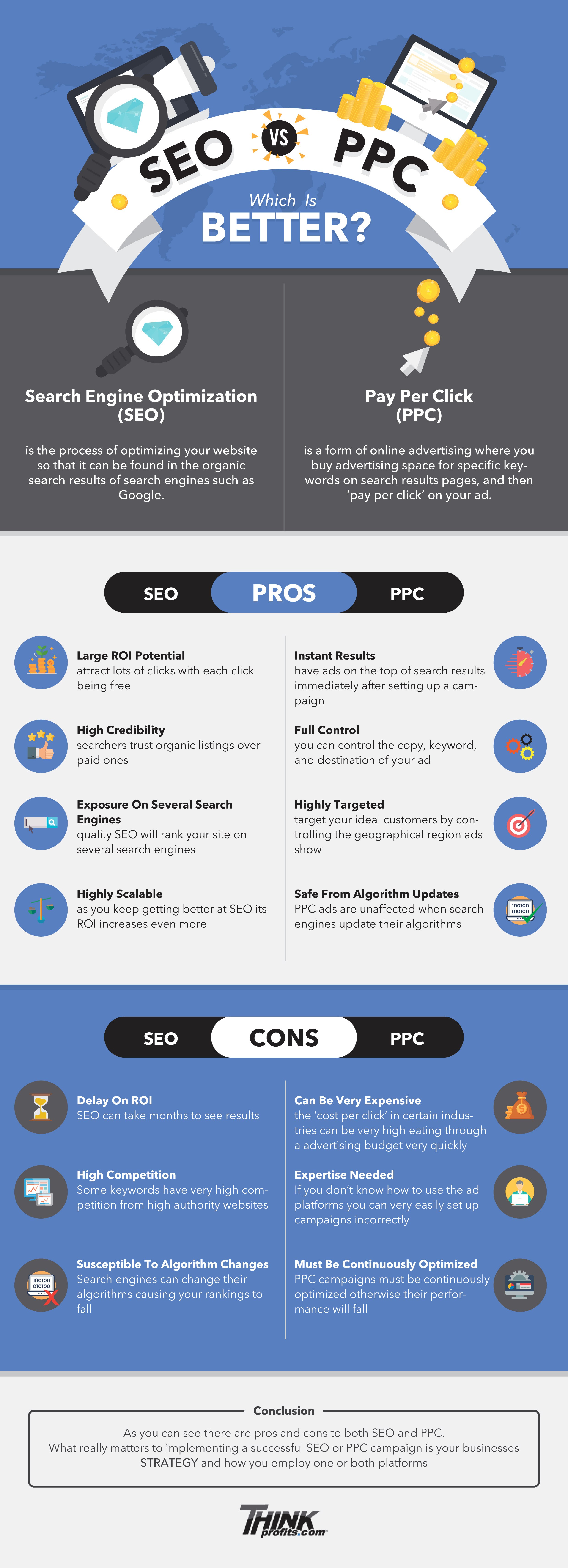Join 40,000+ sales and marketing pros who receive our weekly newsletter.
Get the most relevant, actionable digital sales and marketing insights you need to make smarter decisions faster... all in under five minutes.
Should My Business Invest in SEO or PPC? [Infographic]

Jun 10, 2018
![Should My Business Invest in SEO or PPC? [Infographic]](https://www.impactplus.com/hs-fs/hubfs/should-my-business-invest-in-seo-or-ppc.png?length=1200&name=should-my-business-invest-in-seo-or-ppc.png)
Any time that someone asks me a question I don’t know the answer to or drops a fact I find hard to believe, I reach for my phone to Google it.
Google is our fact checker and seemingly the source of any and all information. I mean, there’s a reason why search engines are the default homepage on most browsers.
We’re always looking for answers and this is especially true when it comes to researching products or services we’re considering buying.
Whether we’re looking for a car or a lawyer, we turn to Google. That’s why as marketers, it’s important to make sure when people are looking to buy a product or service you offer, your websites needs to be in the search engines waiting for them.
Enter SEO and PPC.
While SEO and PPC are both effective methods for boosting website traffic, do you know when you should be using one over the other?
Here’s a breakdown of these two search engine strategies as well as the pros and cons of using each one.
SEO
Search engine optimization is about optimizing your website through the process of identifying industry related keywords you want to target and creating/optimizing content and your website around them.
Using SEO is a great way for you to organically increase your traffic.
Like any digital marketing strategy, SEO regularly changes, based on the behaviors of consumers.
Think about the way you searched for something ten years ago.
Not only did companies create less content, but there was a lot of keyword stuffing.
Today, things are different.
With billions of pieces of content out there, Google and other search engines are looking for the most relevant content that’s easy to read and provides visitors with the complete answer.
Google is regularly making updates to their algorithm, to better achieve this, and we don’t always know about them. Unfortunately, it could affect your SEO strategy. Forcing you to adapt in order to stay on the first page of SERP results.
- The potential to rank on page one of search results by creating quality content.
- Search users are more likely to trust organic search listings over promoted listings.
- Little to no cost
- It can take several months for your SEO efforts to generate an ROI.
- Google regularly makes updates to their algorithm that you can be susceptible to.
- Ranking on the first page of search results can be difficult, especially when you’re up against high-authority websites.
PPC
If you’re unfamiliar with PPC, it stands for pay-per-click, which is a form of online advertising -- allowing you to pay a set amount for each click your ad receives.
While PPC is also associated with social media advertising, in this case, Think Profits is referring to paid search.
Through PPC, you’re able to choose the copy of your ad as well as which audience keywords are targeted.
When searching a keyword or question in Google, paid search results will be displayed above organic search results.
The major difference between SEO and PPC is having a budget dedicated to promote content for the keywords you’re trying to target.
- You can immediately see results upon setting up the campaign.
- Unlike organic SEO, PPC ads are unaffected by Google algorithm updates.
- You can ensure your ads are getting in front of the people you want to reach
- PPC ads aren’t something you can set and forget. You should be regularly optimizing your campaigns and making tweaks to improve click throughs and the amount of site visitors that become contacts.
- Depending on your industry, PPC ads can become extremely expensive really fast. Before you know it, you can eat through your budget.
Should You Use SEO or PPC?
Whether you’re using PPC or not, you still need to be creating quality content that resonates with your audience, because once they’re on the page, they can leave just as quickly as they arrived.
Still not sure whether SEO or PPC is best for you and your company? Check out the rest of Think Profits infographic below for more pros and cons.
Free: Assessment
